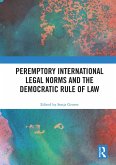Can multilateral treaties succeed in transforming conduct when they are rejected by the most powerful states in the international system? In the past two decades, coalitions of middle-power states and transnational civil society groups have negotiated binding legal agreements in the face of concerted opposition from China, Russia, andmost especiallythe United States. These instances of a so-called 'new diplomacy' reflect a deliberate attempt to use the language of international law to bypass great power objections in establishing new global standards. Yet critics have frequently derided such treaties as utopian and counter productive because they fail to include those states allegedly most capable of effectively managing complex international cooperation. Thus far no study has offered a systematic, comparative study of the promise, and limits, of multilateralism without the great powers. Norms Without the Great Powers addresses this gap through the presentation of a novel theoretical account and detailed empirical evidence regarding the implementation of two archetypal cases, the antipersonnel Mine Ban Treaty and International Criminal Court. Both treaties have substantially reshaped expectations and behaviour in their respective domains, but with important variation in the extent and breadth of their impact. These findings provide the impetus for assessing the prospects for similar strategies on other topics of contemporary global concern. This book offers a timely addition to the dynamic and growing literature on the practice and consequences of international governance and should appeal to academics, civil society experts, and foreign policy practitioners working in fields such as security, human rights, and the environment.
Dieser Download kann aus rechtlichen Gründen nur mit Rechnungsadresse in A, B, BG, CY, CZ, D, DK, EW, E, FIN, F, GR, HR, H, IRL, I, LT, L, LR, M, NL, PL, P, R, S, SLO, SK ausgeliefert werden.









